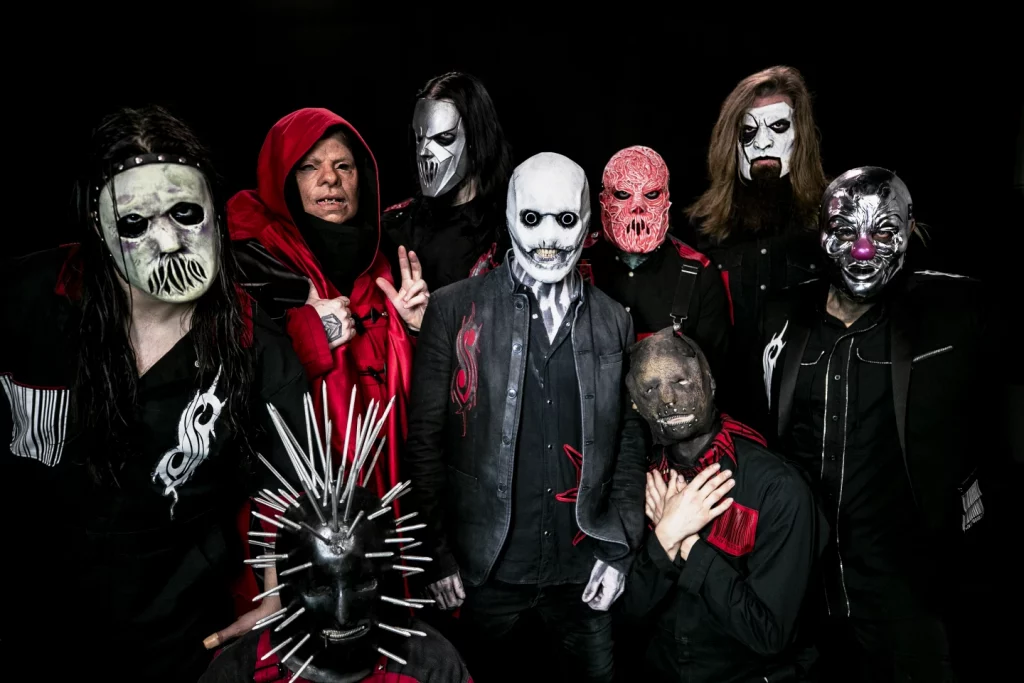Blog
Slipknot: Unmasking the Legacy of Metal’s Most Intense Band
Introduction: Few bands have managed to capture the sheer intensity and raw power of heavy metal quite like Slipknot. Known for their aggressive sound, chaotic live performances, and distinctive masked personas, Slipknot has carved out a unique niche in the world of metal. This article explores the origins, evolution, and enduring impact of Slipknot, uncovering the elements that make them one of the most influential and controversial bands in modern music.
Origins and Formation: Slipknot was formed in Des Moines, Iowa, in 1995 by percussionist Shawn Crahan, drummer Joey Jordison, and bassist Paul Gray. They were later joined by vocalist Corey Taylor, guitarists Jim Root and Mick Thomson, sampler Craig Jones, DJ Sid Wilson, and percussionist Chris Fehn. The band quickly gained attention for their eclectic lineup and intense performances, marked by their use of elaborate masks and matching jumpsuits, which added an element of theatricality to their shows.
Breakthrough and Rise to Fame: Slipknot’s self-titled debut album, released in 1999, was a critical and commercial success, introducing the world to their brutal, high-energy sound. Tracks like “Wait and Bleed” and “Spit It Out” showcased their ability to blend crushing riffs, frenetic drumming, and Taylor’s versatile vocals. The album’s success propelled Slipknot into the mainstream, earning them a dedicated fanbase and establishing them as a force to be reckoned with in the metal scene.
Evolution of Sound: Over the years, Slipknot has continued to evolve, experimenting with different styles while maintaining their core intensity. Their second album, “Iowa” (2001), is often regarded as one of their heaviest and darkest works, with tracks like “People = Shit” and “Left Behind” pushing the boundaries of extreme metal. Subsequent albums such as “Vol. 3: (The Subliminal Verses)” (2004) and “All Hope Is Gone” (2008) saw the band incorporating more melodic elements and diverse influences, showcasing their growth as musicians.
Themes and Lyrics: Slipknot’s music often delves into themes of anger, alienation, and inner turmoil, reflecting the band’s tumultuous experiences and the struggles of their fans. Songs like “Duality,” “Psychosocial,” and “Snuff” tackle issues such as mental health, societal pressure, and personal loss. Corey Taylor’s powerful lyrics and emotive delivery resonate deeply with listeners, providing a cathartic outlet for their own frustrations and pain.
Live Performances and Masked Identity: Slipknot’s live performances are legendary for their intensity and chaos. The band’s high-energy shows feature elaborate stage setups, pyrotechnics, and an almost palpable sense of danger, creating an unforgettable experience for fans. Their use of masks and costumes adds to the mystique, allowing members to adopt alter egos and connect with their audience on a visceral level. This unique visual identity has become synonymous with Slipknot and is an integral part of their brand.
Impact and Legacy: Slipknot’s influence extends beyond their music. They have inspired countless bands with their innovative approach and uncompromising attitude. Despite controversies and lineup changes, including the tragic deaths of Paul Gray in 2010 and Joey Jordison in 2021, Slipknot has persevered, continuing to release critically acclaimed albums and perform to sold-out crowds worldwide. Their resilience and dedication to their craft have solidified their status as icons in the metal community.
Conclusion: Slipknot’s journey from the underground metal scene to global stardom is a testament to their unrelenting passion and creativity. Through their powerful music, theatrical performances, and distinctive visual identity, they have left an indelible mark on the world of heavy metal. As they continue to push the boundaries of their genre, Slipknot’s legacy as one of the most intense and influential bands in modern music remains unchallenged.
 Skip to content
Skip to content

